|
2007
25
February - 25 March

Phillip
McLeish : Recent Paintings
Opening Sunday 25 February 2007 3-5pm
Born in 1950, Phillip McLeish has lived and painted in and around
the Northcliffe region in the deep South West Karri forests of Western
Australia since 1975 and was for many years Howard Taylor’s
personal studio assistant.
Painting has been a constant pursuit through all this time. He has
spent many of those years at work in the South West forests witnessing
on a consistent basis the distinct local phenomena.
Such isolation has enabled him to absorb the consequentiality of
his subject matter. His paintings have a deep sense of place and
reveal knowledge gained experiencing the intricate balance and play
between light, form, growth and seasonal shifts.
Having recently temporarily moved his studio north to a beach side
location in Bunbury, McLeish has experienced a dramatic shift in
coastal structure, intensity of light and weather patterns.
This exhibition where paintings from the Southern Ocean meet paintings
from the Indian Ocean follows on from a very successful exhibition
at Galerie Düsseldorf in 2005
Image : Looking Back 2005 Oil on Canvas 122 x 213 cm
1
- 29 April
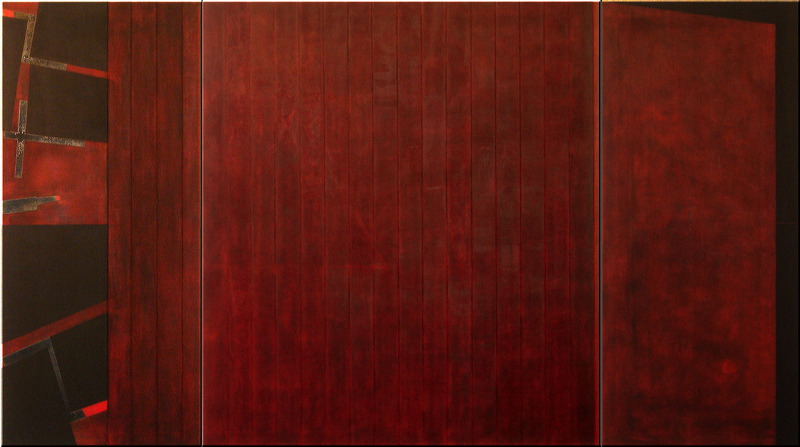
XXXVII
Guantanamo Fence 2006/2007 Oil Acrylic Automotive Lacquer Enamel &
Wax on Canvas 1800 x 3000 x 60 mm
John
Teschendorff : History
of Ideas Series IV
History
of Ideas Series IV continues John Teschendorff's exploration into the
potential for emotional
response to the materiality of the image and increasingly to the contemporary
events that inform the works. Submerged beneath a seductive abstracted
surface is an interrogation of conflict/war/religious bigotry/democratic
process/guilt/death/torture/terror/. There is something in these works
that seeks to reclaim some humanity from the calculated horror &
depravity of twenty-first century conflict.
Valerie
Tring : Anxious Watercolours

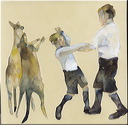
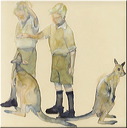
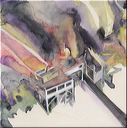
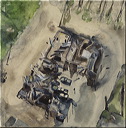
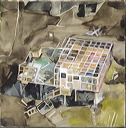
I
am in possession of a large ( 22 colour pan) black metal ‘Made
in England’ Winsor & Newton watercolour paintbox.
For several years now I have been obsessed with the medium of watercolour.
The place of watercolours as paintings rather than drawings on paper
– as finished and autonomous (‘Projective’ as described
by Bois). This is not unrelated to the story of exhibition watercolours
and the societies that promoted them alongside oil paintings. Watercolour’s
peculiar qualities of transparency and portability made it the medium
for recording the origins of flora and fauns; architecture and its ruins;
landscapes and the weather. The shape of colour in water…sometimes
fugitive pigments “ colours…held on the paper by a feeble
binding of gum” (Thackeray). What began with ‘stained drawing
methods’ (tinting- imitating tone in oils), opened out into pure
washes of colour (British artists working in Italy @1780)
My own watercolour fetish began with the mysterious and delicate watercolours
of jellyfish on vellum, and others kangaroos and possums by Charles
Alexandre Lesueur in the 1999 Museum of Sydney exhibition ‘Terre
Napoleon: Australia through French Eyes 1800-1804’ curated by Susan
Hunt and Paul Carter. On display were wonderful watercolours by Lesueur
& Petit unofficial artists for Nicholas Baudin’s exploration
of Australia on the floating laboratories, the Geographie & the
Naturaliste. Thereafter I began experimenting with watercolours on leather
especially soft kangaroo skin- my local suppliers are two elderly Polish
leather merchants and boot makers who are known for designing the best
riding boots in Sydney including polo boots for the late Kerry Packer.
Anxiety is the subject and rhetoric of my watercolours – whether
baby animals- brightly coloured - fragile and pensive -‘Others’
(2002-2004); or kangaroos and boys- play-fighting, ‘Anxious emblems’
(2005-2007) ; and Antipodean landscape ruins –of houses after bushfires,
cyclones or floods- ‘Ruinscapes’ (2002+) . I first exhibited
the ‘Ruinscapes’ in a touring exhibition ‘Academici:
Australia Council VACB Rome Studio residency 1999-2004’ in May
2005 just months after the nightmare of the Tsunami in the Pacific Ocean.
In recent years research on the physical science of climate change has
been prepared and reported on with growing urgency, projecting extremes
and intensities of heatwaves and cyclones.
One of D?rer’s most unusual watercolours is ‘Vision of a Cloudburst’,
1525 paitned by the artist after a disturbing dream of a deluge…when
he tried to describe how the water struck the ground at a distance with
such force it could be heard as a frightening roar. A wonderous watercolour,
but anxious.
13
May - 10 June
Tom
Múller : EXPEDITION
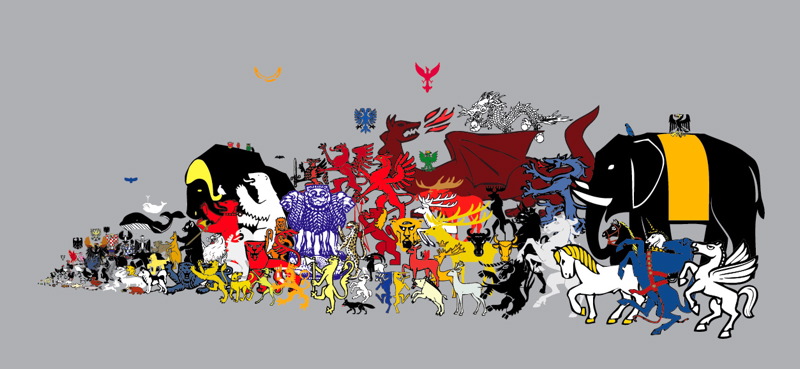
Galerie DüsseldorfTom Mùller’s sense of aesthetics
is closely tied to his appreciation of functionality. His deliberations
can therefore begin with an object such as a passport or a credit card
or equally a scenario such as ‘what would a map of the world look
like if all the nations were superimposed over their central axis?’
His practice is concerned with both elegance of appearance and versatility
of application. Images, objects and events function as crisp signifiers
for the circulation of value and meaning through global systems of all
kinds.
Drawn to investigate processes and protocols that have been universally
adopted, Mùller has issued passports on-line, posed as the concierge
of a hotel and opened Supermart (2004), a supermarket for limited edition
works. His digital prints and paintings have captured the patterns of
rivers and airport runways in recognition of how these markers define
territory.
In his upcoming exhibition Expedition , Mùller explores new uncharted
territory, by delving into the lands of heraldry and national symbols.
In Heraldic Animals, he groups animals borrowed from various coats of
arms from around the world. The animals appear liberated from their
national duties and are seen to be marching towards a common direction.
With Fables he explores the myth behind these heraldic animals and narrates
a modern tale of national symbols.
By resizing and juxtaposing deserts and likening mountain ranges to
graphs, Mùller asks us to consider the future of nature and how
the meaning of geography is shifting.
Expedition is an excursion into the worlds where culture and nature
collide.
Douglas
Sheerer : Articulated Constructions + Paintings + Holograms
   
Opening
Sunday 13 May 2007 3-5 pm
GALERIE
DÜSSELDORF The ‘Articulated’ and ‘Info Stack’
series of works are a originate from a constantly ongoing investigation
into the simplicity and complexity of refracted and reflected light.
Planes that seamlessly come together visually in one way will segregate
and cause a ruptured in another. I try to keep as many components as
possible equal in intensity, size and ambience - the articulation of
many planes can be manipulated by the viewer to create differing structures,
shadow formations and imbued colour. In this way and under a controlled
system I stand a remote chance of creating a structure that is both
simple and complex. The verso paintings are directly related to the
‘Articulated’ and ‘Info Stack’ constructions and
depict the verso colouration structure used to cause the various infered
colours
The holographic works for me are not just a record of the ‘interference
pattern’ created when the beams of laser light interfere on the
holographic surface. The resulting hologram stands in place of the ‘departed
object’ recorded by the holographic surface, and preserved through
the developing process.
The bands of light and dark act as an extremely sophisticated diffraction
grating, so that when light passes through the plate, it interferes
to form the exact image of the object and scenario that was recorded.
Viewing the hologram at different angles will give a different view
of the object, thus giving it its three dimensional appearance.
5
Aug - 2 Sept
Bruce
Slatter : WAY, SHAPE OR FORM

| Bruce
Slatter : WAY, SHAPE OR FORM
Bruce
Slatter’s recent work plays with ideas of protection, containment
and concealment.
WAY, SHAPE OR FORM uses combinations of objects that imply potential
actions and suggest narrative possibilities. Objects are linked
through a purpose built casing; encouraging the viewer to imagine
their utility, promise and failings
Image
: Wheelbarrow Dimensions – Height 1470 mm x Width 1400 mm
x Depth 1400 mm
Materials – Wheelbarrow, Plywood
5
Aug - 2 Sept
.
|
5 Aug - 2 Sept
Sarah
Elson
: Anigozanthos (eudaimonia hybrid)

9
Sept - 7 Oct
Mike
Singe : GROUP SHOW
.jpg)
Download
invite to exhibition in pdf format
Mike
Singe's work is not just witty - it is seriously reflective and
re-manifests life and experiences within it.
In this new exhibition entitled 'GROUP SHOW' Mike Singe presents
a divergent series of superbly sculptured works each with their
own unique conceptual and aesthetic properties. This approach reflects
the artist's “art making” methodology over the past 18
months where a variety of materials, techniques and ideas have been
investigated. |
9
Sept - 7 Oct
Jánis
Nedéla : RUNNING BACKWARDS

Download
invite to exhibition in pdf format
|
JÁNIS
NEDÉLA
R
U N N I N G B A C K W A R D S
Opening
Sunday 9 September 2007 3 - 5 pm (gallery open from 2pm)
GALERIE
DÜSSELDORF
Artopia
free Artist’s floor talk Sunday 30 September 3pm
Exhibition dates: 9 September - 7 October 2007
Image : ‘TYPO #7’ 2007 - Etched Acrylic - Diptych
21 x 14 x 3 cm Photographer: Martin Farquharson
|
14
Oct - 11 Nov
Brian
McKay : New Works
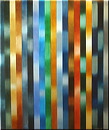  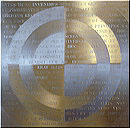
The
West Australian 05/10/2007
| Brian
McKay is one of Western Australia's most senior and respected artists.
Born in Meckering in 1926 his work has been the subject of major
surveys at The Art Gallery of Western Australia and most recently
at the Holmes á Court Gallery. More dynamically than ever,
McKay is pursuing his exploration into the properties of refracted
light and imbued colour through the active manipulation of metal
surfaces and the application of geometric design. |
18
Nov - 16 Dec
Frank Morris : Chiming Wedgebill

Frank
Morris : Woodlines 2007 Gesso + Acrylic on MDF 180 x 400 cm Photo :
Pascal Veyradier 2007
18
Nov - 16 Dec
Jill
Kempson : Skyscapes

Jill
Kempson : Verdant Green 2006Oil on Marine Ply 22.5 x 30 cm
Vast
skies under which one seems to disappear... The South West region
of Western Australia holds these secret and majestic landscapes,
virtually untouched, gracefully sculpted by time and the elements.
Waychinicup is one place I have painted over the years, the Place
of Emu Dreaming, as it is still revered today by local indigenous
people.
The clarity of light which characterises most Australian landscapes
finds there, an unprecedented subtlety of tonalities.
These elusive moods echo my previous series, Tonalities of Time
- The Forgotten Ways, from my research in Europe in 2006 of Old
Masters painting techniques.
Skies and clouds, sand and water are in essence universal phenomena
which, once on the canvas draw the viewer in, for a moment of stillness
and reflection, on the primal power of nature as well as one's passage
in time. |
|